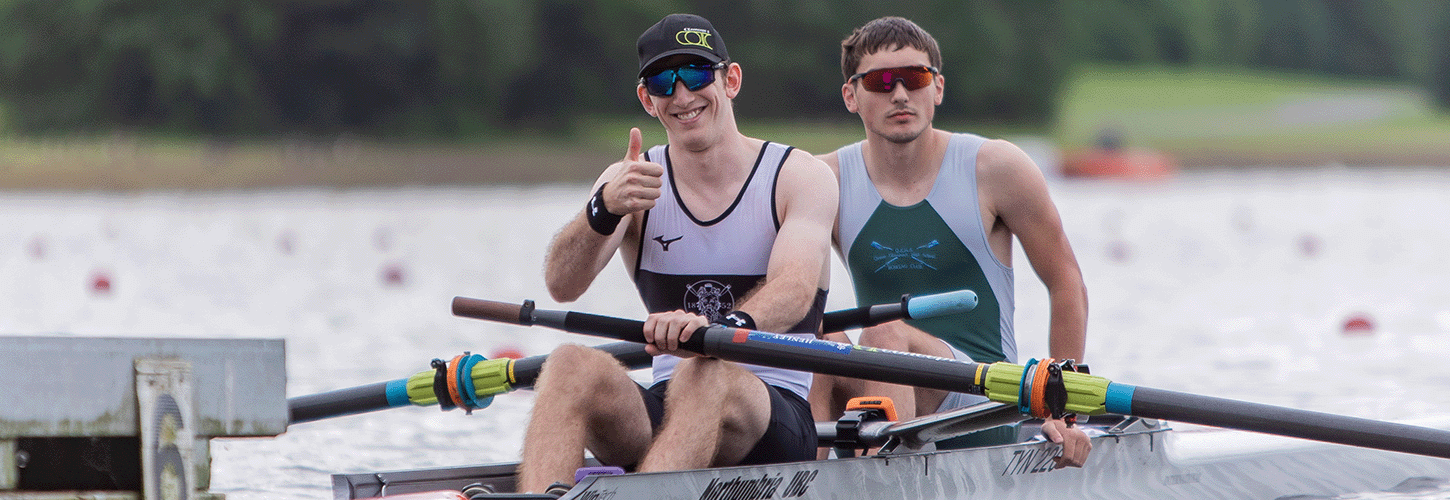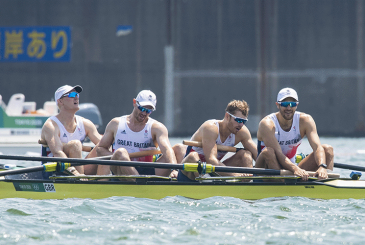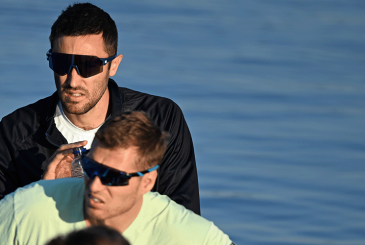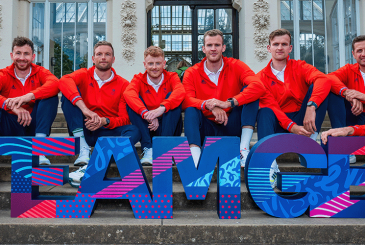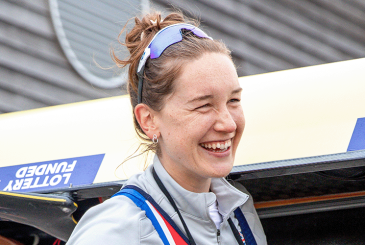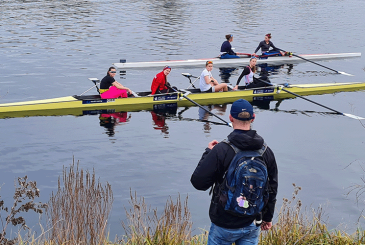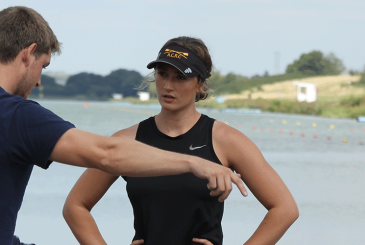Cam Buchan discusses the ins and outs of “race day” – from what you might feel the night before a race to what you might face when you are heading up to the start line
Before I talk about the ins and outs of race day, I want to go over the reasons why we put ourselves forward to race in the first place, with all the additional stresses that come with it. Here are two of the biggest reasons for you to get out there and race:
- Learning to deal with uncertainty – when you are training, most things are familiar; you know roughly how the workout will go, you know the landmarks, and there’s no unexpected shouting from your opposition’s coach.
On Race Day, there is an additional level of stress and unfamiliarity which can change your approach to the session or even your technique. We may think that we are bulletproof but when put under pressure, can we hold up to our own high standards? The only way to find out is to send it in a race and see if we can stick to our guns; if not, we know what we can work on! - Learning how to perform under pressure – if the extra “stress” during race day is dealt with correctly, it can lead to a better performance than you might have been able to get in training. This is down to the extra pressure and the additional “drive” to go faster.
Whether there is a boat next to you pushing you in the last 500 metres or the name on the erg screen closing in on you, you will be pushed to your limits. If you harness the “stress” of race day and convert this into positive energy, you can reach levels that are so difficult to achieve in a more relaxed training environment.
Now that we have discussed why we might want to race, let’s talk about the experience you might have during race day itself.
On the night before racing, if you cannot sleep, just close your eyes and breathe
Leading up to race day
We will start with the feelings throughout the event, even starting the night before. For me, race day is something that I look forward to as soon as I see it marked on the calendar. As the event gets closer and closer, I become increasingly nervous; I know that I need to perform on that exact day. Prior to race day, I can have such a mix of nerves and excitement that can make it difficult to sleep.
One of the best pieces of advice I received from the now GB Rowing Team Men’s Olympic High Performance Coach Steve Trapmore, was “on the night before racing, if you cannot sleep, just close your eyes and breathe. You will still be resting, which is what your body needs, and is a lot better than if you are on your phone or staying ‘fully awake’”. I know that sometimes it’s not as easy as that but to me, it made a lot of sense. There is no point in getting super worked up to a point that sleep is a struggle. Time will move on and you might as well try and get some rest!
The feeling of nervousness and excitement leans more towards the excitement side of the scale when it hits race day itself. I have done all my training already, I can no longer get any fitter or stronger. I can only give my best on race day.
On race day
On race day, there is usually an early wake up which can offer a small sense of calm on what can be a very busy day as the race time approaches. Make sure you’ve planned your race day nutrition in advance.
Depending on when and how long your race is, many people like to get a little workout in before the race itself so it means either getting on the water or erg a few hours before and getting the legs feeling “awake”.
During this workout I hope to feel fresh and prepared, but sometimes it just doesn’t feel that way. In some pre-race workouts you can feel untouchable, in others you can feel so heavy. I have found neither one has produced better performances as long as, like I said above, you have confidence in the fact that you have already put in all the work and it is time to do as best you can.
Following the pre-race workout there is some time to kill before the race. It always seems like this time moves so fast. I like to make sure that I have everything with me that I might need. My water bottle, my workout outfit, lucky socks – whatever it may be – I make sure I have it with me when I am packing my bag so when it comes to this time of waiting before the race I don’t have to stress about going to find what I might need.
It’s time for the race now, but of course, we have to get the warm-up done before we get there. It is time for hands on the boat or to sit on the erg to start moving again. The warm-up is really important both for physical and mental preparation. Similar to the pre-race workout, I am hoping to feel strong. If I am seeing numbers and feeling good, I feel more ready. With the adrenaline building, I find that in this warm-up I have to hold back as I can see numbers on the screen that are too fast but they feel so easy! We need to remember to stick to our plans.
The race itself
Now the warm-up is done and I have made it to the start line. This is where the mind games hit their peak. There are two places I generally end up in when I am at the start line, either, “why am I here?” or “how did I get here?”. The “why?” is a more negative mind space to be in but one to be understood. My body knows what is about to happen and is almost trying to convince me I don’t want to. The “how?” is a more positive place to be. A celebration in my mind of what I have done to get here and now it is time to reap the benefits of all of that.
If you know you have given your all and gone as fast as you could on that day, you cannot ask yourself for more
You might find yourself somewhere in-between these thoughts or somewhere else entirely but regardless, I received a great piece of advice from double Olympic champion Alex Gregory: “If you’re struggling on the start line and looking for some confidence in yourself, I like to put the pressure on someone else. My coach? Someone in my boat? They’re going to do great here and all I have to do is be with them or follow their instructions. It’s easy!” Now this is an internal conversation with yourself, I wouldn’t tell my pair partner on the start line that it is all on them!
We have made it through sitting on the start line and we are in the race. All the training we have done up to now is geared towards this very point. I recommend heading to my previous article on The “dreaded” 2,000m row for some tips on a 2k, but they will also apply to any race.
After the race
Crossing the finish line is always a huge rush of emotion, regardless of result. You’re physically exhausted. The noise of the race stops so suddenly, maybe you have some new noises – a crew member throwing up, or maybe even yourself. For me, the best way I can go through the finish line is knowing I couldn’t have gone much faster. At the very least, if I didn’t go as fast as I could, I would like to know the reason for this. If you know you have given your all and gone as fast as you could on that day, you cannot ask yourself for more; it was impossible for you to go faster, so why question it?
You have made it to the end of the race, you have trained for weeks, months or perhaps years for what has just happened. Now it is finished. We all see the podiums, the celebrations, the hugs, the tears. What we do not see is the mental battle within some athletes – the “what now?”. This can hit athletes regardless of result.
If the result is good, it can sometimes soften the blow, but it is usually lurking there somewhere. This “what now?” can be as small as heading to the next race in a day, a week a year. It could be as big as, “I never want to do that again ”as famously heard when Steve Redgrave, multiple Olympic champion, was interviewed after winning his fourth Olympic medal. Redgrave went on to say, “If anyone sees me go near a boat, you’ve got my permission to shoot me.”
Emotions can be running high after a race and athletes need time to “come down” from their race experience. For some, it doesn’t take long but for others it can take weeks, months or even years. On top of this mental battle, there are of course the physical stressors from which an athlete needs to recover; these can take just as long to repair.
And that’s it!
We have made it through race day. Perhaps there have been some sentiments in this article you can relate to and which you felt alone in feeling, or perhaps you go through an entirely different physical and emotional experience on race day. Either way, I hope this has helped in some way to prepare you for the races in your season ahead. Most of what I talked about were the mental aspects of the race experience which I believe are a large part of succeeding on the day. Just remember, the physical prep has been done – go smash it!
Photo: AllMarkOne


